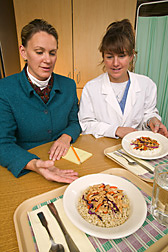This page has been archived and is being provided for reference purposes only. The page is no longer being updated, and therefore, links on the page may be invalid.
Read the magazine story to find out more. |
|
Fat-Fighting Secrets of Whole-Grain Foods
By Marcia WoodMarch 21, 2006
Crunchy whole-wheat toast and other whole-grain foods are already known to help keep in check the body's levels of certain fats. A preliminary study led by Agricultural Research Service (ARS) chemist Nancy L. Keim provides new details about how whole grains might do that.
National guidelines recommend eating at least three servings of whole-grain foods every day. But most Americans get less than a single daily serving.
Keim, with the agency's Western Human Nutrition Research Center in Davis, Calif., and her University of California-Davis colleagues worked with 10 healthy female volunteers, aged 20 to 45, for the study.
Volunteers went on two separate, 3-day regimens, one featuring meals high in whole grains and the other offering meals with refined-grain foods. When on the whole-grains regimen, for example, the women would have a chicken stir-fry with pearled barley--instead of white rice--for dinner.
Each regimen was followed by a test breakfast at the laboratory. On that day, volunteers gave a blood sample before eating and at three intervals later that day.
Scientists found two significant differences in particles--known as VLDLs or "very-low-density lipoproteins--that transport fat in the blood.
First, volunteers' VLDLs had higher levels of a kind of fat, known as a triglyceride, following the refined-grains test breakfast than following the whole-grains test meal. Second, volunteers' VLDLs had a higher amount of another worrisome compound--this one known as apoCIII (short for apolipoprotein CIII)--following the refined grains test meal.
In medical studies, higher levels of triglycerides and of apoCIII have both been associated with higher risk of heart disease.
Keim reported these findings at the 2005 meeting of the Federation of American Societies for Experimental Biology. She plans to start a longer, larger followup study later this year.
Read more about the study in Agricultural Research magazine's March 2006 issue, which focuses on ARS obesity research.
ARS is the U.S. Department of Agriculture's chief scientific research agency.

